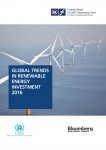A UN Environment Programme (UNEP) report, titled 'Global Trends in Renewable Energy Investment 2016' (GTR), finds that global investments in renewables in 2015 hit a new record high at US$286 billion and that, for the first time, investments in renewables in developing countries topped those of developed countries.
 24 March 2016: A UN Environment Programme (UNEP) report, titled ‘Global Trends in Renewable Energy Investment 2016’ (GTR), finds that global investments in renewables in 2015 hit a new record high at US$286 billion and that, for the first time, investments in renewables in developing countries topped those of developed countries.
24 March 2016: A UN Environment Programme (UNEP) report, titled ‘Global Trends in Renewable Energy Investment 2016’ (GTR), finds that global investments in renewables in 2015 hit a new record high at US$286 billion and that, for the first time, investments in renewables in developing countries topped those of developed countries.
The tenth edition of UNEP’s annual report, the GTR was prepared by the Frankfurt School-UNEP Collaborating Centre for Climate & Sustainable Energy Finance and Bloomberg New Energy Finance. According to the report, in 2015, coal and gas-fired generation attracted less than half as much capacity investment as renewables, which added more to global energy generation capacity than all other technologies combined.
In his foreword, UN Secretary-General Ban Ki-moon observed that the report “increases our confidence that a low-carbon world is attainable and that we are on the right path to reach our objectives,” also those under the Sustainable Development Goals (SDGs).
The report consists of ten sections that address, inter alia: investment by type of economy; renewables and storage; investment sources; asset finance; small distributed capacity; public markets; venture capital and private equity; research and development; and acquisition activity.
The report finds that the amount of generating capacity added in wind and solar photovoltaics in 2015 amounted to 118 gigawatt (GW), whereas the next highest annual figure was 2014’s 94 GW. Overall, renewables, excluding large hydro, made up 53.6% of the GW capacity of all technologies installed in 2015, which, for the first time, represented a majority.
Among the GTR’s key findings is that developing world investments in renewables increased by 19% from 2014, and, at US$156 billion, were, for the first time, higher than those of developed countries, which, at US$130 billion, went down 8% compared to 2014. Much of the developing world’s record-breaking investment trend can be attributed to China where investment in renewables went up 17% to US$102.9 billion, representing 36% of the world total. Other developing countries showing increased investment included India (up 22% to US$10.2 billion), South Africa (up 329% to US$4.5 billion), Mexico (up 105% to US$4 billion) and Chile (up 151% to US$3.4 billion). The report also reveals that, among developed countries, investment in Europe was down 21%, from US$62 billion in 2014 to US$48.8 billion in 2015, which is the continent’s lowest figure in nine years.
While the fact that the power generation capacity added by renewables exceeded new capacity added from conventional sources in 2015 indicates an ongoing structural change, renewables, excluding large hydro, still represent about one-sixth of the world’s total installed power capacity, and actual electricity generated by those renewables in 2015 was 10.3% of global generation. “Despite the ambitious signals from COP 21 in Paris and the growing capacity of new installed renewable energy, there is still a long way to go,” said Udo Steffens, President of the Frankfurt School of Finance & Management.
The GTR is a sister publication to the Renewables Global Status Report (GSR) produced by the Renewable Energy Policy Network for the 21st Century (REN21). The next edition of the GSR will be available in June 2016. It provides an overview of renewable energy market, industry, investment and policy developments worldwide. [Publication: Global Trends in Renewable Energy Investment 2016] [Frankfurt School-UNEP Collaborating Centre for Climate & Sustainable Energy Finance Press Release] [Global Trends in Renewable Energy Investment 2016 Webpage]